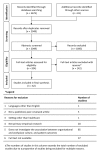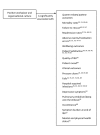Association between organisational and workplace cultures, and patient outcomes: systematic review
- PMID: 29122796
- PMCID: PMC5695304
- DOI: 10.1136/bmjopen-2017-017708
Association between organisational and workplace cultures, and patient outcomes: systematic review
Abstract
Design and objectives: Every organisation has a unique culture. There is a widely held view that a positive organisational culture is related to positive patient outcomes. Following the Preferred Reporting Items for Systematic Review and Meta-Analyses statement, we systematically reviewed and synthesised the evidence on the extent to which organisational and workplace cultures are associated with patient outcomes.
Setting: A variety of healthcare facilities, including hospitals, general practices, pharmacies, military hospitals, aged care facilities, mental health and other healthcare contexts.
Participants: The articles included were heterogeneous in terms of participants. This was expected as we allowed scope for wide-ranging health contexts to be included in the review.
Primary and secondary outcome measures: Patient outcomes, inclusive of specific outcomes such as pain level, as well as broader outcomes such as patient experience.
Results: The search strategy identified 2049 relevant articles. A review of abstracts using the inclusion criteria yielded 204 articles eligible for full-text review. Sixty-two articles were included in the final analysis. We assessed studies for risk of bias and quality of evidence. The majority of studies (84%) were from North America or Europe, and conducted in hospital settings (89%). They were largely quantitative (94%) and cross-sectional (81%). The review identified four interventional studies, and no randomised controlled trials, but many good quality social science studies. We found that overall, positive organisational and workplace cultures were consistently associated with a wide range of patient outcomes such as reduced mortality rates, falls, hospital acquired infections and increased patient satisfaction.
Conclusions: Synthesised, although there was no level 1 evidence, our review found a consistently positive association held between culture and outcomes across multiple studies, settings and countries. This supports the argument in favour of activities that promote positive cultures in order to enhance outcomes in healthcare organisations.
Keywords: Health & safety; clinical governance; health policy; organisational development; public health; quality in healthcare.
© Article author(s) (or their employer(s) unless otherwise stated in the text of the article) 2017. All rights reserved. No commercial use is permitted unless otherwise expressly granted.
Conflict of interest statement
Competing interests: None declared.
Figures
Similar articles
-
Drugs for preventing postoperative nausea and vomiting in adults after general anaesthesia: a network meta-analysis.Cochrane Database Syst Rev. 2020 Oct 19;10(10):CD012859. doi: 10.1002/14651858.CD012859.pub2. Cochrane Database Syst Rev. 2020. PMID: 33075160 Free PMC article.
-
Interventions for preventing and reducing the use of physical restraints of older people in general hospital settings.Cochrane Database Syst Rev. 2022 Aug 25;8(8):CD012476. doi: 10.1002/14651858.CD012476.pub2. Cochrane Database Syst Rev. 2022. PMID: 36004796 Free PMC article.
-
Signs and symptoms to determine if a patient presenting in primary care or hospital outpatient settings has COVID-19.Cochrane Database Syst Rev. 2022 May 20;5(5):CD013665. doi: 10.1002/14651858.CD013665.pub3. Cochrane Database Syst Rev. 2022. PMID: 35593186 Free PMC article.
-
Home treatment for mental health problems: a systematic review.Health Technol Assess. 2001;5(15):1-139. doi: 10.3310/hta5150. Health Technol Assess. 2001. PMID: 11532236
-
Antidepressants for pain management in adults with chronic pain: a network meta-analysis.Health Technol Assess. 2024 Oct;28(62):1-155. doi: 10.3310/MKRT2948. Health Technol Assess. 2024. PMID: 39367772 Free PMC article.
Cited by
-
An international study on implementation and facilitators and barriers for parent-infant closeness in neonatal units.Pediatr Investig. 2022 Aug 13;6(3):179-188. doi: 10.1002/ped4.12339. eCollection 2022 Sep. Pediatr Investig. 2022. PMID: 36203512 Free PMC article.
-
Patient safety reporting and learning system of Catalonia (SNiSP Cat): a health policy initiative to enhance culture, leadership and professional engagement.BMJ Open Qual. 2024 Aug 7;13(3):e002610. doi: 10.1136/bmjoq-2023-002610. BMJ Open Qual. 2024. PMID: 39117393 Free PMC article.
-
Unveiling the Heartbeat of Healing: Exploring Organizational Culture in a Tertiary Hospital's Emergency Medicine Department and Its Influence on Employee Behavior and Well-Being.Int J Environ Res Public Health. 2024 Jul 12;21(7):912. doi: 10.3390/ijerph21070912. Int J Environ Res Public Health. 2024. PMID: 39063488 Free PMC article.
-
Understanding organisational culture for healthcare quality improvement.BMJ. 2018 Nov 28;363:k4907. doi: 10.1136/bmj.k4907. BMJ. 2018. PMID: 30487286 Free PMC article.
-
Enhancing Interprofessional Collaboration in Perioperative Setting from the Qualitative Perspectives of Physicians and Nurses.Int J Environ Res Public Health. 2021 Oct 14;18(20):10775. doi: 10.3390/ijerph182010775. Int J Environ Res Public Health. 2021. PMID: 34682520 Free PMC article.
References
-
- Smircich L. Concepts of culture and organizational analysis. Adm Sci Q 1983;28:339–58. 10.2307/2392246 - DOI
Publication types
MeSH terms
LinkOut - more resources
Full Text Sources
Other Literature Sources



